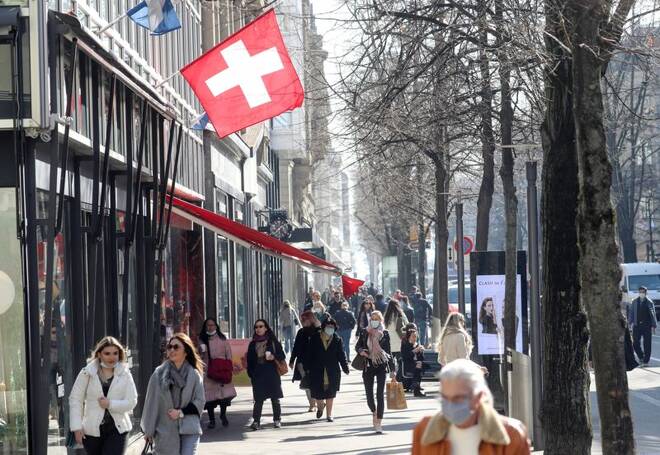Advertisement
Advertisement
Swiss cut economic growth forecasts, citing war risks and inflation
By:
ZURICH (Reuters) - The Swiss economy is expected to expand by 2.6% in 2022, the government said on Wednesday, becoming the latest region to downgrade its growth estimates due to the war in Ukraine and uncertainties in China.
By John Revill
ZURICH (Reuters) -Switzerland became the latest country to downgrade its economic growth forecasts on Wednesday, with the government warning risks stemming from the war in Ukraine and food and energy inflation have increased.
The Swiss economy is expected to expand by 2.6% in 2022, the State Secretariat for Economic Affairs (SECO) said, revising down its March forecast for growth of 2.8%.
SECO also reduced its growth forecast for 2023 to 1.9% from 2.0%. All the figures are adjusted to take out the effect of sporting events.
But in the negative scenario, growth could slow down to 2.4% this year and the Swiss economy could stagnate in 2023 if gas supplies from Russia are halted, SECO Deputy Director Eric Scheidegger said.
“The direct impact of the war in Ukraine on Switzerland is limited. Swiss goods exports to Russia and Ukraine were only 1.4% of the total last year,” he told Reuters.
“However there is an effect from higher energy and raw material prices. Then there is inflation generally which is rising outside the country,” he said.
Scheidegger declined to speculate on the probability of the worst-case scenario, saying only the base case was the most likely.
According to SECO’s base scenario, Swiss inflation is seen at 2.5% this year before dropping to 1.9% in 2023, levels Scheidegger said were tolerable for Swiss industry.
An end to Russian gas supplies – either because of an European Union embargo or a decision by Moscow – would make matters worse.
“It could lead to energy shortages in Europe and Switzerland. It would also lead to higher inflation, which would weigh on consumer spending. It would also mean more uncertainty, which would mean less investment by companies,” Scheidegger said.
Some 47% of Swiss gas imports originate directly or indirectly from Russia, according to government data.
Switzerland’s lower growth estimates follow downgrades by the OECD for global growth and a more cautious outlook in Germany and France.
The Swiss National Bank will take into account the latest forecasts at its policy meeting on Thursday.
(Reporting by John Revill; Editing by Michael Shields and Tomasz Janowski)
About the Author
Reuterscontributor
Reuters, the news and media division of Thomson Reuters, is the world’s largest international multimedia news provider reaching more than one billion people every day. Reuters provides trusted business, financial, national, and international news to professionals via Thomson Reuters desktops, the world's media organizations, and directly to consumers at Reuters.com and via Reuters TV. Learn more about Thomson Reuters products:
Did you find this article useful?
Latest news and analysis
Advertisement
